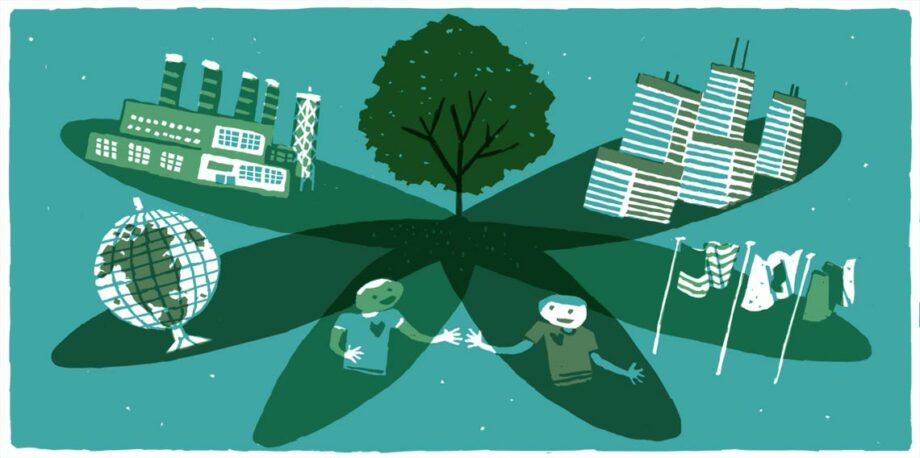April 26, 2013 — The challenges humanity faces today are perhaps our greatest in history. Over the next 50 years, fortunes will be gained and lost, companies will rise and fall, leaders will come and go. With so much at stake and so much to change, a properly motivated and equipped individual can have a profound impact. No matter where you come from, where you work or what your career path, sustainability gives each of us a unique opportunity to leave our mark.
With that in mind, here are six things you must know to prepare yourself for successful sustainability efforts in business. These six “know thys” can help you focus on the right areas, contribute to useful dialogue, convene the relevant players, collaborate for visionary change and deploy resources for lasting outcomes.
Know Thy Planet
Our planet is an extremely complex system of elements that interact according to the intractable laws of science. But humankind’s heavy footprint has put the planet’s natural systems (which we are a part of and depend on) out of balance. If you want to be part of the solution, you need solid grounding in how our planet functions. That’s not to suggest everyone should have a Ph.D. in geophysics. But a fundamental grasp of the principles of biology, physics and the chemistry that binds it all together, will keep us on track.
It takes a life cycle view of products and services up and down the value chain to achieve sustainable development — so wherever that’s not happening is the real opportunity.
Lack of such grounding has caused immeasurable waste of resources, failed businesses and over-hyped “green” technologies that detract from truly scalable innovation. Without grounding in science, you can’t thoughtfully debate whether paper is a more sustainable choice than plastic, let alone the rate at which forests sequester or release carbon.
Know Thy Country
Where you live and work on this planet has everything to do with the impact you can have. Cultures are different, ecosystems are different, resources are different, problems are different — and therefore solutions are different. You need to understand the policies, players and issues that shape all of these. Practically every cultural behavior or law of the region has some connection to social justice, energy, water, food or land. Your awareness and engagement with public policy and cultural norms will increase your chance of success.
Know Thy Industry
Some people think if you choose to work in an industry that’s perceived as a carbon culprit, you are guilty by association. That’s a sad conviction because it precludes attracting the necessary talent and change agents to address problems where they are needed most.
No matter what sector you work in, you must be deeply aware of how your industry fits into the order of things. Where are the environmental and societal touch points? Who are the major players, and where can game-changing collaborations happen? What markets does your industry serve, and how can sustainability transform them? It takes a life cycle view of products and services up and down the value chain to achieve sustainable development — so wherever that’s not happening is the real opportunity.
There is hardly anything significant one can accomplish alone in the arena of sustainability.
Know Thy Company
Most companies express their corporate strategy through mission, vision and value statements. Whatever they’re called, do yours include notions of sustainability? Are they just words on a poster in the break room, or are people actually held accountable? Are there explicit sustainability goals every employee can own? Is performance against those goals communicated transparently? Are personal goals aligned to strategy, and do employees have the tools and resources to deliver? Are you surrounded by like-minded people who share your passion? Do those in charge lead by example?
Too many companies have an eye on the future but both feet firmly planted in the past. For maximum impact, sustainability must be central to company strategy, engrained in the culture and embedded in the reward structure. Think about where the barriers are to delivering on those promises and where the strengths are to build on.
Know Thy Partners
There is hardly anything significant one can accomplish alone in the arena of sustainability. Sustainable development cannot be a solitary activity. Breaking down silos, designing around systems and scaling solutions that benefit all must be done in collaboration, and you need to know with whom you’re working. Your customers, clients, suppliers and advisors all have a direct impact on you, as you do on them. Finding the right non-governmental organization partners is often critical to accelerating sustainability improvements of a company. Choose carefully. Make sure you have common values, objectives and agendas. Build trust over time, and you can build momentum together.
Know Thy Self
In many ways, a commitment to sustainability is an unselfish endeavor, because you are contributing to the future of people you will never meet. You’re making decisions and taking actions today so those who follow will not be denied access to the amazing bounties of nature. By definition, sustainability is about changing systems that don’t work to systems that do. That can feel like a lonely path. Is this a cause worth fighting for? Does your moral compass point you there? Are you motivated and up to the task? Where are your blind spots?
How well informed are you about your Six Know Thys? Master each one, and you can rise to the occasion. And “the occasion” matters immensely.
![]()
Editor’s note: The views expressed here are those of the author and not necessarily of Ensia. We present them to further discussion around important topics. We encourage you to respond with a comment below, following our commenting guidelines, which can be found here. In addition, you might consider submitting a Voices piece of your own. See Ensia’s “Contact” page for submission guidelines.
Ensia shares solutions-focused stories free of charge through our online magazine and partner media. That means audiences around the world have ready access to stories that can — and do — help them shape a better future. If you value our work, please show your support today.
Yes, I'll support Ensia!

But big progress towards sustainability is not going to happen until there are numbers that track performance about all the big things that matter ... of which many are so called externalities and ignored by both economists and CFOs who are part of the decision making elite.
I want to see accounting that incorporates not only the money profit dimension of data, but complementary value metrics that measure impact on people and planet in a manner that is as rigorous as conventional accounting.
It can be done ... and when it is done, there will be a sea change in the performance of the corporate community and the financial sector.
Peter Burgess - TrueValueMetrics
Multi Dimension Impact Accounting